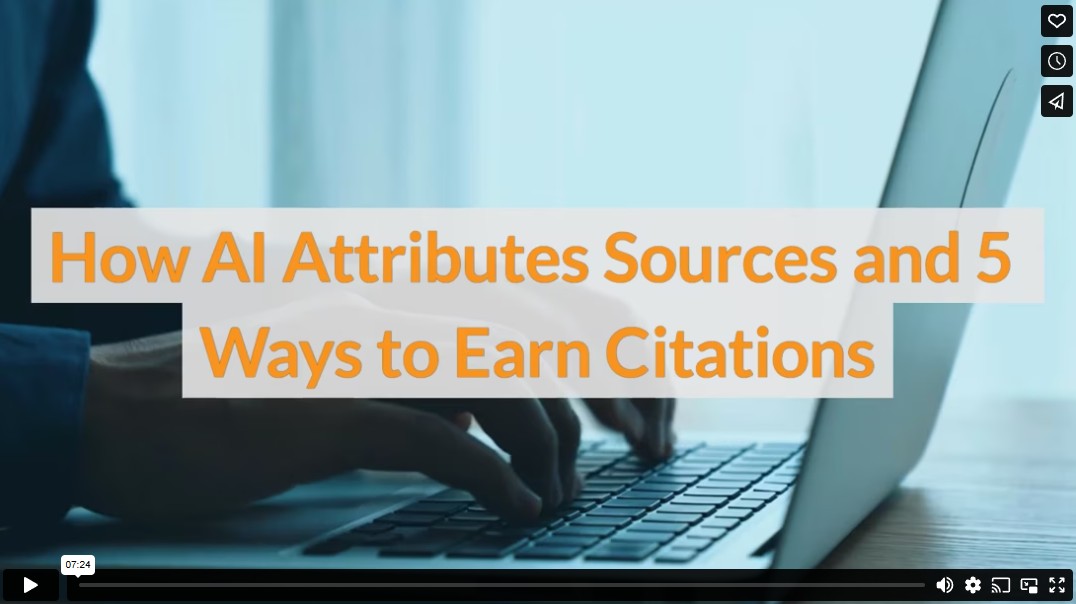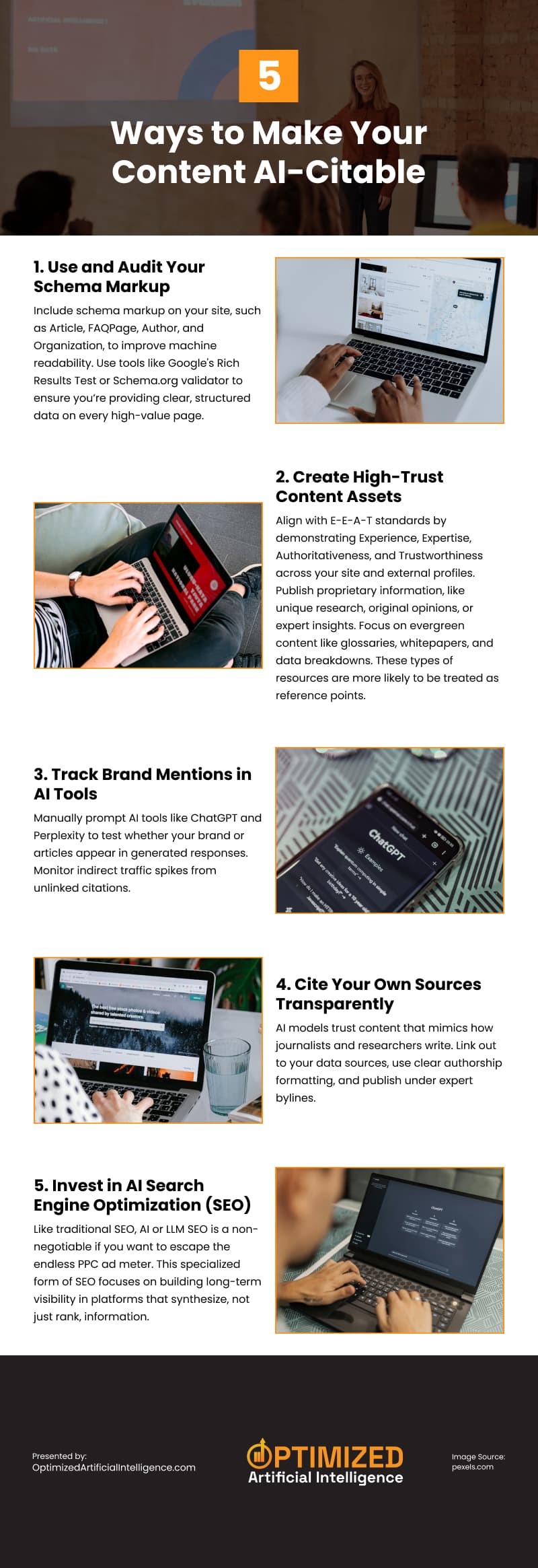With search engine optimization for AI, it’s no longer about getting your brand to land in the top 10 search results. It’s about being selected, cited, and trusted by AI systems.
You’re not just optimizing to rank; you’re optimizing to be referenced.
But unlike traditional citations with clear SEO tracking, AI-generated citations come from opaque processes. Understanding when AI search engines credit sources and how to position your content for attribution is crucial if you want your voice included in the answers users actually see.

(Matheus Bertelli/pexels)
How AI Models Choose When to Cite a Source
AI search engines like ChatGPT, Perplexity, and Google’s generative search models operate differently from standard search engines. Instead of presenting a list of blue links, they synthesize information into summarized responses. Sometimes, those summaries include explicit citations, but not always.
The decision to cite depends on several variables:
- Whether the content contains unique factual claims or figures that must be verifiable.
- The confidence score the model assigns to the response.
- How closely aligned the content is with what the model was trained or fine-tuned to consider a reliable source.
For example, when answering, “What’s the average cost of a solar panel installation in California?”, a model like Perplexity is more likely to cite a source because the answer involves location-specific data. But for generalized advice like “benefits of drinking more water,” AI may synthesize the information without listing sources, especially if the facts are considered broadly known or already in the model’s pre-training data.
How Various Models Attribute Sources
Different AI platforms treat citations differently.
Perplexity AI is currently the most transparent, often providing direct source links for each sentence or paragraph it generates. If your content is structured, factual, and unique, there’s a better chance of being cited in Perplexity’s responses.
ChatGPT, when used with browsing or plugins, may occasionally mention a source, especially if prompted to, but generally does not automatically cite you unless the content is exceptionally distinct or factual in nature.
Gemini and Google’s Search Generative Experience (SGE) tend to pull from highly trusted, top-ranking pages, which are often reflected in their AI Overviews. However, source attribution is more implied than explicitly shown.
This inconsistency across platforms means you can’t rely on citation as a guaranteed metric. However, you can structure your content to increase the odds of being quoted or referenced when AI models pull from live or indexed web data. This is why it pays to hire Gemini search optimization experts or a ChatGPT SEO agency.
What Makes a Page More “Citable” to AI Search Engines
AI models don’t cite content just because it’s well-written. They cite it because it’s unique, structured, and verifiable. To increase your chances of being cited, you need to go beyond general content and aim for fact-based specificity and clarity.
Here’s how to make your content more “citable”:
- Include original data, research, or clearly sourced third-party statistics.
- Use schema markup to clearly identify authorship, publication date, and article type.
- Write with a focus on accuracy, structure, and clarity, not fluff or filler.
Also, pages that define terms, explain technical processes, or provide high-authority opinions are cited more often. For instance, if your page includes a detailed breakdown of “how search engine crawling works,” and AI sees no better-explained version in its index, your explanation becomes the one worth referencing.
Why You Might Not Be Cited, Even When You’re the Source
One of the biggest frustrations you’ll face in SEO for AI search is seeing your content used in AI-generated responses without attribution. This can happen when:
- Your content is rephrased or paraphrased during synthesis.
- The model was trained on a cached version of your content and no longer references the live link.
- Your data is mirrored by other websites, and the AI model attributes the claim to whichever source appears more authoritative.
This is especially common in ChatGPT responses. Because OpenAI’s models are trained on a mixture of licensed data, publicly available text, and other sources, your website may have influenced its output, even if you’re not credited directly.
5 Ways to Make Your Content AI-Citable
Your goal is to become a preferred node in the AI’s knowledge graph, a recognizable entity that AI systems default to when extracting credible answers. By doing this, you help AI systems better identify, evaluate, and connect your content to relevant user queries, boosting the likelihood that you’ll be included as a cited source.
Don’t be fooled into thinking you need a new website for AI citations. You just need better structure, better signals, and better data. Start with these steps:
1. Use and Audit Your Schema Markup
Include schema markup on your site, such as Article, FAQPage, Author, and Organization, to improve machine readability.
Use tools like Google’s Rich Results Test or Schema.org validator to ensure you’re providing clear, structured data on every high-value page.
2. Create High-Trust Content Assets
Align with E-E-A-T standards by demonstrating Experience, Expertise, Authoritativeness, and Trustworthiness across your site and external profiles.
Publish proprietary information, like unique research, original opinions, or expert insights.
Focus on evergreen content like glossaries, whitepapers, and data breakdowns. These types of resources are more likely to be treated as reference points.
3. Track Brand Mentions in AI Tools
Manually prompt AI tools like ChatGPT and Perplexity to test whether your brand or articles appear in generated responses. Monitor indirect traffic spikes from unlinked citations.
4. Cite Your Own Sources Transparently
AI models trust content that mimics how journalists and researchers write. Link out to your data sources, use clear authorship formatting, and publish under expert bylines.
5. Invest in AI Search Engine Optimization (SEO)
Like traditional SEO, AI or LLM SEO is a non-negotiable if you want to escape the endless PPC ad meter. This specialized form of SEO focuses on building long-term visibility in platforms that synthesize, not just rank, information.
By aligning your content with how language models retrieve, validate, and cite sources, you position your brand to show up where the future of search is already happening.
Remember Citations Are Earned, Not Assumed in the AI Era
Being cited by an AI system is no longer just about being relevant. It’s about being trustworthy, structured, and distinct.
The days of expecting credit just for publishing good content are over. If you want AI to attribute your work, you need to give it a reason…and a roadmap.
Think like a machine while writing for humans. The clearer your signals, the stronger your presence. With AI search shaping how visibility works, becoming the source means becoming the answer.
FAQs
1. What are AI citations, and how are they different from traditional search engine references?
AI citations are references included in AI-generated answers or summaries that attribute content to specific sources. Unlike traditional search engines that display links based on keyword matching and ranking, AI models selectively synthesize responses and may or may not explicitly cite sources. These citations depend on content clarity, structure, and whether the AI deems the information verifiable and unique.
2. When do AI search engines decide to cite a source?
AI models are more likely to cite a source when responding to fact-based, time-sensitive, or statistical queries. The model often references external sources to ensure trustworthiness if a query requires a high confidence level, such as citing pricing, research, or definitions.
Citations are less common for generalized or widely known topics, where the model synthesizes information from its training data or multiple inputs.
3. Why does Perplexity AI cite sources more frequently than ChatGPT?
Perplexity AI was built with a strong emphasis on transparency, often including source links for nearly every sentence in its responses. This design gives users confidence in the information and allows them to verify facts easily.
ChatGPT, particularly in its default mode, focuses more on fluid conversation and may not include citations unless prompted or operating in browsing mode.
4. Why might my website’s content appear in an AI-generated answer without being cited?
AI models often paraphrase or generalize content based on multiple sources, especially if the information is not presented in a unique or structured way. If your content mirrors what’s already widely available, the model may synthesize your contribution without attributing it directly.
Additionally, AI may have trained on older or cached data, meaning it can reference your content without pointing to your live site.
5. How can I make my content more likely to be cited by AI tools?
Focus on publishing original insights, proprietary data, and clearly sourced facts that add value beyond general knowledge. Use structured data formats like schema markup to help AI interpret the content and connect it to specific entities.
The more unique, authoritative, and technically readable your content is, the higher the chances AI platforms will cite it.
6. What kind of schema markup helps with AI citations?
Schema types like Article, FAQPage, Person, Organization, and WebPage help define authorship, content type, and context for machines. When properly implemented, schema allows AI models to understand who wrote the content, what it’s about, and when it was published.
This structured clarity can enhance your site’s credibility and make it a more attractive citation candidate.
7. Is being cited by an AI search engine as beneficial as ranking on page one of Google?
It depends on the platform’s user behavior. Being cited by Perplexity or Google’s AI-generated summaries can significantly increase brand authority and visibility, especially if the user relies solely on the AI response without scrolling through organic listings.
While it may not always lead to direct traffic, citation boosts recognition and trust, often translating into indirect benefits over time.
8. Can I track AI citations the same way I track backlinks?
Currently, no universal tool tracks AI-generated citations in the same way SEO platforms track backlinks. However, you can monitor branded search traffic, use AI platforms manually to check citations, and watch for unexplained spikes in referral traffic.
As AI usage grows, you can expect new tools to emerge that provide better tracking and attribution metrics.
9. What are some examples of content that AI is more likely to cite?
AI models tend to cite data-rich pages, expert explainers, original research, and industry-specific glossaries. For example, a blog post titled “2024 SaaS Benchmarks Based on 1,000 Companies” is more likely to be cited than a generic “What is SaaS?” overview.
Content that delivers niche-specific value and includes clear authorship and publication context stands out to AI systems.
10. Does being cited by AI help with traditional SEO rankings?
While AI citations don’t directly influence your rankings in Google’s traditional search index, the credibility and authority signals they build can improve your domain’s reputation. These citations may lead to backlinks, brand mentions, or traffic that indirectly supports your SEO performance.
Over time, being recognized by AI search systems reinforces your place in both search environments.


